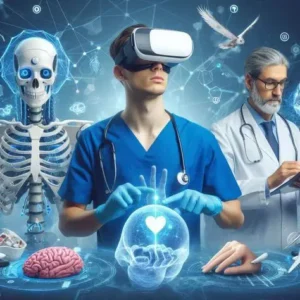Hello! At any point considered how artificial intelligence (AI) is impacting the manner in which we approach medical services? On the off chance that you’re interested about how Western Washington is utilizing artificial intelligence (AI) to change medication, you’re perfectly positioned. In this blog, we’ll plunge into how clinical artificial intelligence is improving patient consideration, how it affects medical care suppliers, and which medical clinics are driving the charge. By and by, you’ll have an unmistakable comprehension of why this innovation is a distinct advantage. Find out about artificial intelligence’s future in medical care. Learn more about AI’s future in healthcare.
How AI is Changing Healthcare in Western Washington
AI in healthcare isn’t just a futuristic concept—it’s happening right now, especially in Western Washington. Hospitals and clinics are using AI to diagnose diseases faster, plan personalized treatments, and even predict patient outcomes. This means better care for you and more efficient systems for healthcare providers.

Let’s break it down. Imagine a doctor who can quickly analyze complex data and suggest the best treatment options. That’s AI at work! It helps doctors look at patient histories, lab results, and even genetic information to make well-informed decisions. Hospitals like Overlake Medical Center are already using these AI tools to improve patient care. Learn more about AI’s potential.
Western Washington University is also at the forefront of integrating AI in healthcare education, helping future healthcare professionals understand and utilize these tools effectively. Explore their AI in healthcare initiative.
Applications of AI in Healthcare
You might be wondering, “What exactly can AI do in healthcare?” Well, the applications are vast! Here’s a quick rundown:
- Diagnostics and Imaging: AI can analyze medical images like X-rays or MRIs with incredible accuracy, often spotting issues that a human might miss.
- Predictive Analytics: By looking at data patterns, AI can predict how a disease might progress or how a patient will respond to a treatment.
- Personalized Medicine: AI helps tailor treatments based on a patient’s unique genetic makeup, making healthcare more personalized and effective.
- Administrative Efficiency: AI also helps hospitals run more smoothly by automating routine tasks like scheduling, billing, and even managing medical records.

AI Change Healthcare
These advancements aren’t just theoretical—they’re being used right now in hospitals around Western Washington. Discover more about AI’s key elements in healthcare.
Which Hospitals in Western Washington Are Using AI?
So, which hospitals are actually putting AI to work? Overlake Medical Center is one standout example. They’re using AI to enhance diagnostic accuracy and streamline patient care processes. But they’re not alone—many other hospitals in the region, including those affiliated with Western Washington Medical Group, are also adopting AI to improve healthcare delivery. Read more about AI in Western Washington hospitals.
Joseph Smecker, a healthcare technology leader in the region, is also contributing to the AI-driven transformation in medical practices. Connect with him on LinkedIn for more insights.
Conclusion
AI is not just the future of healthcare; it’s the present, especially in Western Washington. By integrating AI into medical practices, hospitals are able to provide better care, diagnose diseases more accurately, and streamline their operations. As AI continues to evolve, we can only expect more innovative applications that will further transform healthcare.
FAQs
- How is AI used in the medical field?
AI is used to analyze medical data, assist in diagnostics, predict patient outcomes, and personalize treatments. - What are the applications of AI in healthcare?
Applications include medical imaging analysis, predictive analytics, personalized medicine, and improving administrative efficiency. - Which hospitals in Western Washington use AI?
Overlake Medical Center is a key example, among others, that use AI to enhance patient care and operational efficiency. Learn more here.
